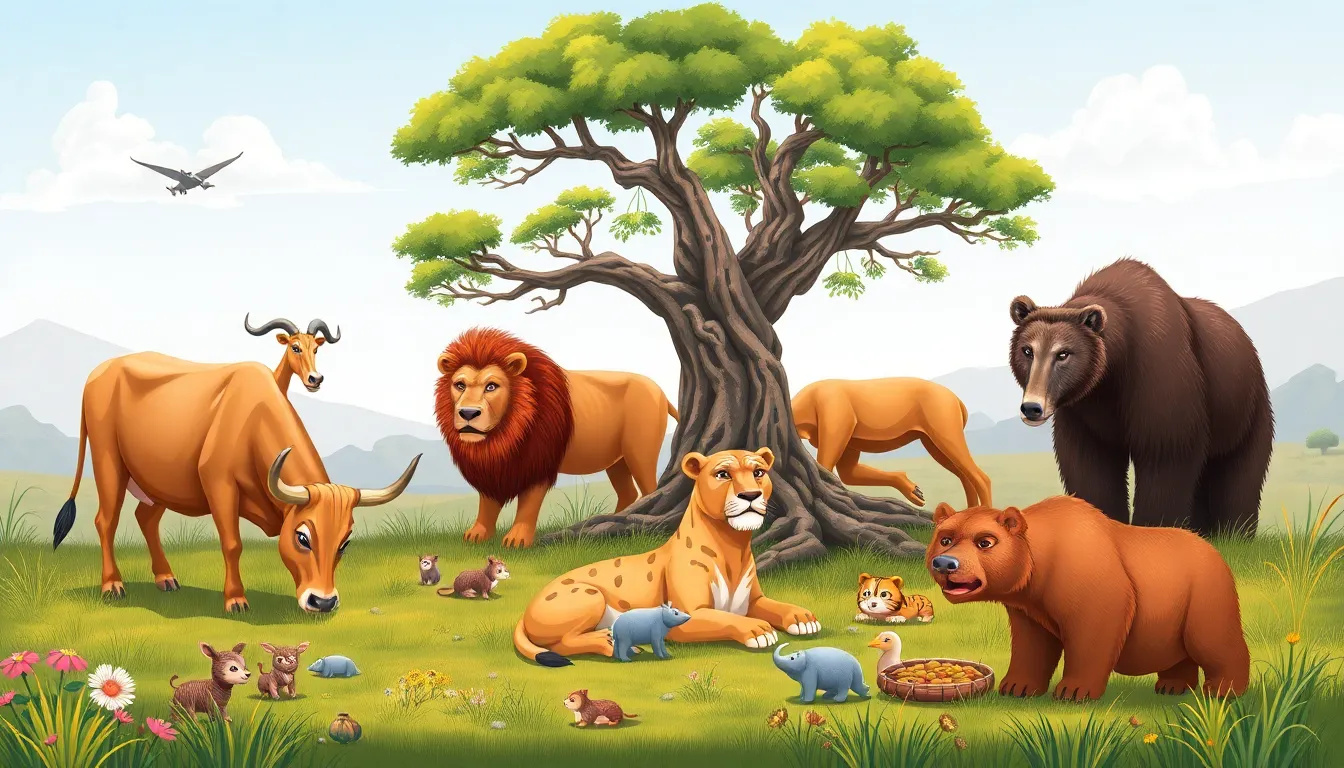When it comes to keeping pets happy and healthy, nutrition is the unsung hero. Just like humans, animals thrive on a balanced diet, but let’s face it—most pets would happily trade their kibble for a gourmet feast. It’s not just about filling their bowls; it’s about giving them the fuel they need to chase squirrels, nap like pros, and strut their stuff at the dog park.
Understanding animal nutrition can feel like deciphering a secret code, but it doesn’t have to be rocket science. With a sprinkle of knowledge and a dash of humor, pet owners can make informed choices that keep their furry friends wagging their tails and purring with joy. So buckle up as we dive into the colorful world of animal nutrition, where every meal can be a masterpiece and every snack a step toward better health.
Understanding Animals Nutrition
Nutrition plays a crucial role in an animal’s overall health and happiness. A well-balanced diet not only fuels the body but also supports a vibrant lifestyle.
Importance of Nutrition in Animals
Nutrition affects growth, energy levels, and disease resistance in animals. An adequate diet fosters healthy bones and promotes strong immune systems. Without proper nutrition, pets can face health issues like obesity or nutrient deficiencies. Owners must recognize that nutrition influences behavior, skin condition, and coat quality. Dietary choices can help prevent chronic diseases, ensuring longevity and a higher quality of life.
Key Nutritional Components
Proteins serve as the building blocks for tissues in animals. Fats provide essential fatty acids and energy reserves. Carbohydrates supply the necessary energy for daily activities. Vitamins, such as A, D, and E, play vital roles in metabolism and immunity. Minerals like calcium and phosphorus contribute to strong bone health. Water remains the most crucial element for hydration, supporting all physiological functions. Understanding these components allows pet owners to create balanced meal plans that fulfill their animals’ specific dietary requirements.
Types of Animal Diets

Understanding types of animal diets offers insight into specific nutritional needs. Each category plays a vital role in animal health and well-being.
Herbivores
Herbivores primarily consume plant-based foods. This diet includes leaves, fruits, seeds, and stems. Grazing animals, such as cows and rabbits, possess specialized digestive systems that help break down tough plant fibers. These animals rely on carbohydrates for energy and require a higher intake of fiber to promote healthy digestion. Common herbivores include elephants and horses, both needing ample roughage to maintain health. Essential nutrients such as vitamins and minerals from plants support growth, reproduction, and overall vitality.
Carnivores
Carnivores predominantly eat meat. This group includes animals like lions, hawks, and sharks, which require higher protein levels for optimal energy and muscle development. Such proteins provide essential amino acids vital for bodily functions. Carnivores exhibit sharp teeth and claws designed for hunting and tearing flesh, helping them capture prey efficiently. In addition to protein, these animals need fats that support healthy skin and fur. Nutrient-dense diets also enhance their immune responses, aiding in disease resistance.
Omnivores
Omnivores consume both plant and animal matter, giving them dietary flexibility. They often thrive on a varied diet, including fruits, vegetables, grains, and meats. Animals such as bears, pigs, and humans fall into this category, benefiting from a balanced nutrient intake. These diets enable omnivores to obtain necessary proteins, fats, and carbohydrates to maintain energy levels. Their versatile diets support overall health and can adapt to available food sources. Essential vitamins and minerals from both plants and animals promote robust immune systems and vitality.
Nutritional Requirements by Species
Nutritional needs vary significantly among different species. Understanding these requirements helps maintain overall health and well-being.
Common Domestic Animals
Cats typically require high protein diets due to their carnivorous nature. Dogs, being omnivores, thrive on a balanced mix of proteins, fats, and carbohydrates. Rabbits need a high-fiber diet, primarily from hay, to support digestive health. Birds often require pellets combined with fresh fruits and vegetables to ensure a complete diet. Each of these domestic animals benefits from a tailored nutritional approach to prevent health issues and foster vitality.
Wildlife Nutritional Needs
Wildlife exhibits diverse nutritional needs based on species and habitat. Herbivores like deer and giraffes consume large amounts of vegetation, emphasizing the importance of fiber. Carnivorous animals, such as wolves and eagles, rely on protein from prey to sustain energy levels. Omnivores in the wild, including raccoons and bears, capitalize on both plant and animal foods, allowing them to adapt to changing environments. Each species thrives when dietary habits align with natural food sources, promoting ecological balance and health.
Feeding Practices and Recommendations
Feeding practices significantly influence an animal’s health. Understanding the right balance is crucial for pets.
Balanced Diets for Pets
Balanced diets promote optimal health in pets. Dogs require proteins, fats, and carbohydrates in appropriate ratios. Cats thrive on high-protein diets, typically derived from animal sources. Rabbits benefit from high-fiber hay alongside fresh vegetables. Birds often need a combination of pellets and fruits to fulfill nutrient requirements. Meeting these unique dietary needs supports energy levels and overall well-being.
Supplementation and Special Diets
Supplementation plays a vital role when pets face specific health challenges. Certain breeds might require specialized diets, like low-carb options for diabetic dogs. Older pets often benefit from joint supplements to maintain mobility. Consulting with veterinarians ensures appropriate adjustments based on individual needs. Special diets cater to conditions like allergies or sensitivities, allowing pet owners to provide optimal nutrition tailored to their animals.
Conclusion
Prioritizing proper nutrition is essential for the health and happiness of pets. A balanced diet tailored to an animal’s specific needs can significantly enhance their quality of life. Pet owners play a vital role in making informed dietary choices that support their furry friends’ well-being.
By understanding the unique nutritional requirements of different species and breeds, owners can ensure their pets receive the right balance of proteins, fats, and carbohydrates. Regular consultation with veterinarians can further help in identifying any special dietary needs.
Ultimately, investing time and effort into animal nutrition not only promotes longevity but also fosters a joyful and active lifestyle for pets. Each meal is an opportunity to contribute to their overall health and happiness.

